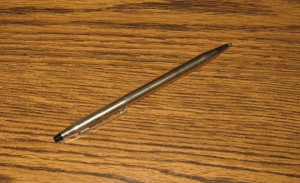Thank you, Isaac Asimov and George Carlin
Who is your muse? How do you remain inspired year after year? What is it that pushes you to deliver new and exciting information to inspire your students?
As I write this in June 2013, I am rapidly approaching a writing milestone. By the time you read this, I will have passed the 1,000 mark in published articles in the corrections field. As I give myself a vigorous pat on the back and utter a few phrases like “atta boy, tiger!”
Having dispensed of the self-congratulations, allow me to I reflect back on the journey of fourteen years.
First, the graphomania was kindled Gogebic Community College. The notes and quirky stories that would become articles and books were initially written for students. It was my way of helping pre-professionals grasp the odd nuances and subtleties of institutional life. The need to express these concepts was the catalyst.
The needs of students served as motivation for the content. Coffee, personal satisfaction and a little bit of ego (Yes, I lay bare my flaws for all to inspect and discuss) fueled the momentum.
I also had some help. The assistance came from two dead men. One is Isaac Asimov and the other is George Carlin.
I admire Asimov for his prolific nature as a writer, his sense of humor, and his clarity. Whenever the haunting specter of writers’ block reared its phantasmagoric head, I could read a little Asimov fiction and find my way back from wordlessness. Thank you, Asimov.
I admire Carlin for his scathing and unapologetic comedy/commentary. His bovine-scatometer was a sensitive instrument of analysis. He could laugh at himself and the world. Carlin’s strange mix of intellect and profanity was unique enough to jolt my brain out of occasional block. Thank you, Carlin.
Different circumstances of writers’ block require different fixes. It is similar to how people select music to fit their mood. To me, Asimov is classic rock with intricate arrangements (Blue Oyster Cult comes to mind). Carlin represents angry but intelligent metal (like Iron Maiden).
At the number 1,000, I feel like I have walked upstairs for a decade and a half. During some flights of stairs, I felt energized and inspired. Other stretches of the upward walk were sluggish and infused with a sense of futility. With quantity, there was always an issue of uneven quality. I know of three instances where I wanted to abandon the literary stair case and never look back.
Now, I am on a landing, looking at another set of stairs to ascend. A glance to my left reveals a level hall way. With that, three questions collide in my skull. Which way do I take? Who or what is my muse? What would Asimov and Carlin do?





